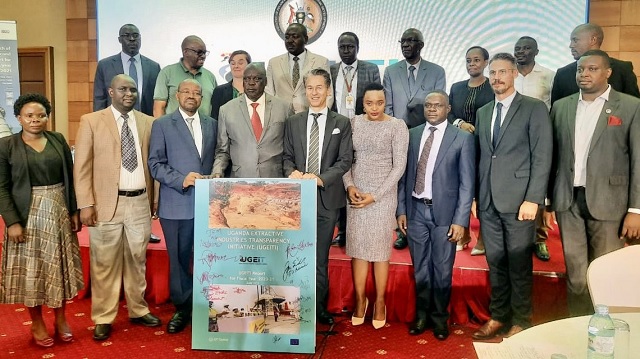
Kampala, Uganda | THE INDEPENDENT | The Uganda government has been hailed on the progress made on transparency in the oil and gas sector, though some challenges remain, according to the Extractive Industries Transparency Initiative (EITI). EITI is the global standard for the prudent management of natural resources, which currently targets the oil gas, and mineral sectors.
Uganda was admitted in 2020 and the EITI is implemented by a multi-sector group (MSG) comprising representatives from the civil society, the extractive industries, and the government. The 2020/2021 transparency report on Uganda, the second, launched Friday, was prepared by DT Global in consortium with BD LLP and VJW Consulting Ltd appointed by the EITI secretariat in Paris as Independent Administrator.
Rashed Malej, representing the Independent Administrator said they were surprised at the level of organisation of Uganda’s transparency process, not expected of a poor country.
State Minister for Minerals, Peter Lokeris stressed that the government was committed to continue improving transparency in the sector to ensure the resources benefit all and especially, that they leave all satisfied and happy. He called on the companies involved in Uganda’s oil and gas and mining sectors to also embrace it, especially regarding full disclosure about their operations and the licenses. The report was funded by the European Union.
Jan Sadek, the EU Head of Delegation in Uganda said there was consistent improvement and that Uganda had done well regarding transparency and disclosures, save for the small holder or artisanal mining licenses where he said there was a need for completion and accuracy of reports. He was, however, confident that Uganda is still young in the EITI and that there was room for improvement, especially in the area of the beneficial ownership information on the miners.
The second UGEITI report covers payments made by the extractive entities revenues received by the government agencies and other material payments and benefits to the government. The report shows that between July 2020 and June 2021, total revenues received from the sector amounted to 241.34 billion shillings, compared to the 436.35 billion recorded in the previous year.
However, Malej stressed that these figures only refer to the transactions that were reported and recorded. He called for efforts to ensure that the informal trade activities are also recorded. Marble accounted for 62 percent of the total value of minerals produced, followed by iron ore at 21 percent, gold at 10 percent, and “others”.
The report shows that the sector’s contribution to national development is still very low, at 1.8 percent of GDP, though it was an increase from 1.6 percent. Contribution to employment is even worse, with just 1,515 people in the oil and gas and mining industry or 0.01 percent of total employable Ugandans.
The report does not include the artisanal miner numbers because of inadequate data, but estimates show that there are about a million workers there. The top contributors to government revenues were TotalEnergies, Tullow Oil, Tororo Cement, Tullow Uganda and Wagagai Mining. The UGEITI Chairman, Siraji Magara said transparency is not only good for the people but also helps the government by easing governance challenges and managing expectations.
On the revenues from the oil and gas, the Petroleum Fund, a depository of all finances accruing from the oil and gas activities, was worth a net of 238.68 billion Shillings at the end of June 2021, up from 88.34 billion Shillings as of June 2020. URA collected 8.7 billion as mineral royalties from mining companies and mineral dealers and the Ministry of Energy transferred Shilings 1.34 billion to local governments and land owners as their share representing 15.4 percent.
State Minister for Finance, Planning and Economic Development, Amos Lugoloobi suggested that the kind of transparency in the extractives should be extended to other resources like energy. He gave the example of water which is the main ingredient for the production of electricity, yet the water sector almost benefits nothing from the energy revenues.
******
URN
 The Independent Uganda: You get the Truth we Pay the Price
The Independent Uganda: You get the Truth we Pay the Price





